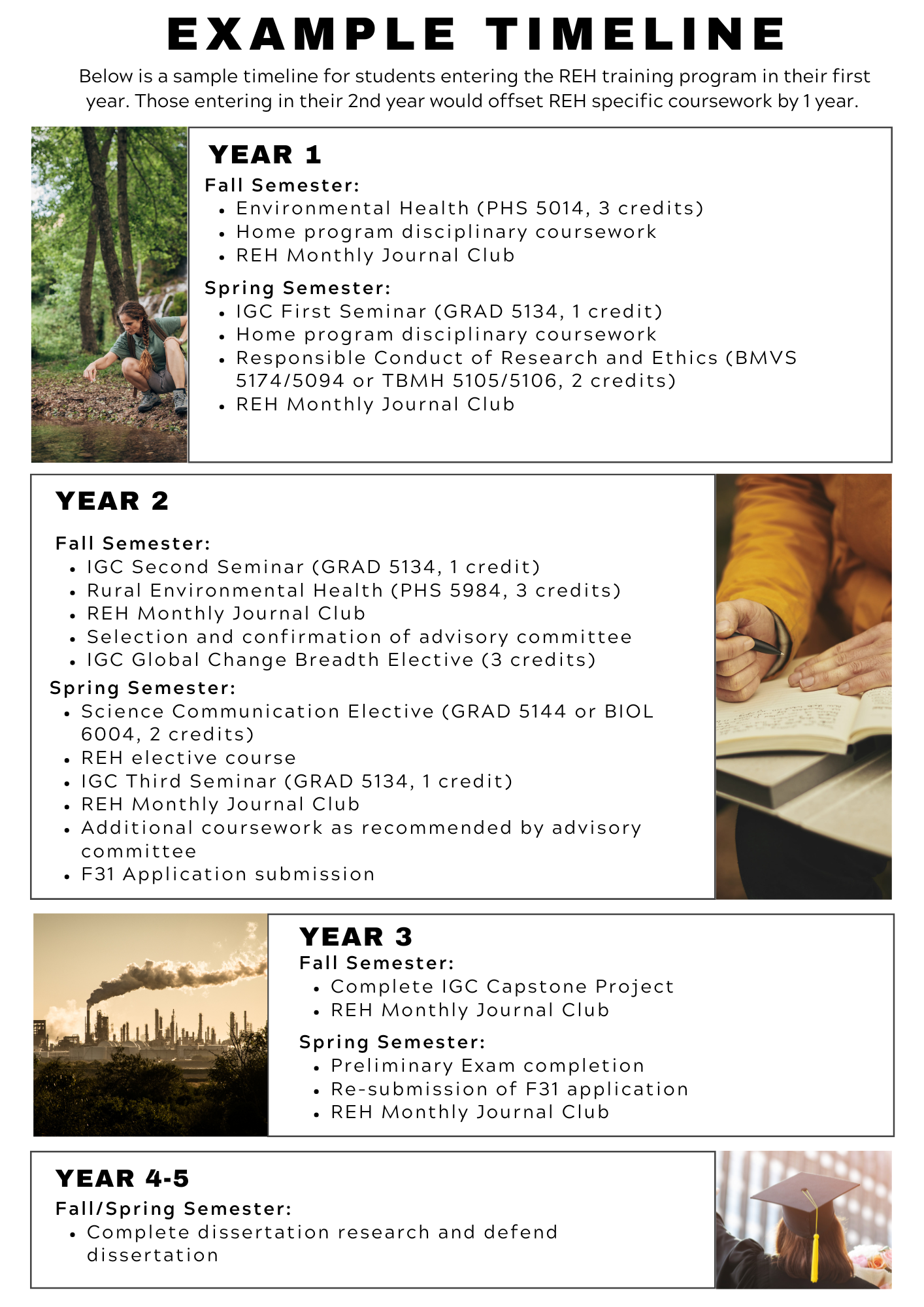REH Courses and Requirements
COURSES & REQUIREMENTS
The REH curriculum is designed to be completed in 3 years and complement home degree program curricula. The REH curriculum will provide environmental health sciences curricula and interdisciplinary training that integrates across the three focus areas, building skills needed to complete their dissertations. For all of the participating degree programs, REH coursework will also count towards degree program elective requirements; therefore the REH curriculum is not expected to extend student’s time to degree.
All REH T32 Trainees will be required to complete the following coursework:
Students will take Environmental Health (PHS 5014):
This course provides REH trainees with a grounding in methods to characterize how chemical, biological, and physical agents in natural and built environments affect human health. The course focuses on the scientific disciplines central to the science and practice of environmental health, including toxicology, exposure science (including routes through air, water, and food media), environmental and occupational epidemiology, and risk assessment. The course explores how municipal, state, federal, and international agencies design, implement, and evaluate the success of environmental and occupational policies, taking into consideration social and economic factors.
Students will take Rural Environmental Health (PHS 5984):
This course will focus on environmental exposures unique to rural areas, toxicological evidence of human risk from those exposures, challenges of exposure estimation over large geographical areas, low population epidemiological challenges, and application of community-based participatory methods for co-creating interventions that contrast from common solutions applied to urban areas.
Students will take Responsible Conduct of Research and Ethics: BMVS 5174/5094 or TBMH 5105/5106:
This course focuses on scientific integrity and responsible conduct of research as related to studies in life sciences, physical sciences, social sciences, engineering, and humanities. Conflict of interest, human and animal subjects in research, mentor/mentee responsibilities, collaborative research, peer review, research misconduct, responsible authorship and publication, data management, sharing, and ownership, and legal issues in research.
At least one additional graded course will be chosen from the list below, in consultation with their advisory committee, based on the student’s focus area within environmental health sciences.
- Critical Skills in Biomedical Research (BMVS 5114, 3 credits, Instructor David Xie)
- Drinking Water and Health (PHS/CEE 5704, 3 credits, Instructor Alasdair Cohen)
- Epidemiology and Quantitative Methods in Public Health I/II and Lab (PHS 5024,5025,5026, 7 credits)
- Social Epidemiology and Health Inequality (PHS/HD 5254, 3 credits, Instructor Natalie Cook)
- Environmental Monitoring and Sampling (CEE 5724, 3 credits, Instructor: Dan Gallagher)
- Emerging Tools for Environmental Field Research (CEE 5984, 3 credits, Instructor: Gabriel Isaacman VanWertz)
Course in Development:
- Environmental Toxicology
- Monthly Journal Club
In addition to coursework, REH Trainees are also required to participate in a monthly Journal Club. To further differentiate the rural environmental health training program from other VT programs and create a sense of community unique to the REH program, a monthly journal club where students will discuss relevant and recent publications specifically related to rural environmental health has been added. The journal club will be run by steering committee members and students will participate as co-leads at least once per semester. Students will be required to attend Fall and Spring semesters for each year they are an REH fellow.
- Grant Writing
REH trainees will be required to develop an F31 application, which will also serve as the written component of their preliminary examination. This is already required as a component of the participating TBMH and BMVS PhD programs. BMVS students are required to take a grant writing course (BMVS 5174) and REH fellows from other participating PhD programs will be encouraged to take this course to aid in development of the F31 application. Additional trainings are offered to students and faculty for NIH F mechanism training awards and other NIH mechanisms.
- Participation in the Virginia Rural Health Association
All trainees are required to participate in the Virginia Rural Health Association (VRHA) and to present their research at least once at the VRHA annual meeting.
All REH T32 Trainees will be members of the Interfaces of Global Change Interdisciplinary Graduate Education Program.
REH T32 trainees will gain their technical depth of expertise through the REH coursework described above and their degree granting program curriculum. They will broaden their interdisciplinary perspective, communication, and collaboration skills through their participation in the Interfaces of Global Change Interdisciplinary Graduate Education Program (IGC IGEP). Through participation in this program, they will become part of a campus-wide network of scholars studying diverse facets of global change and will have unique access to visiting scholars, workshops, and other professional development opportunities.
The IGC IGEP curriculum includes 8 credits of formal coursework, three 1-credit seminars, one 3-credit Global Change Breadth Elective, and a 2-credit science communication course, and completion of a team science capstone project.




